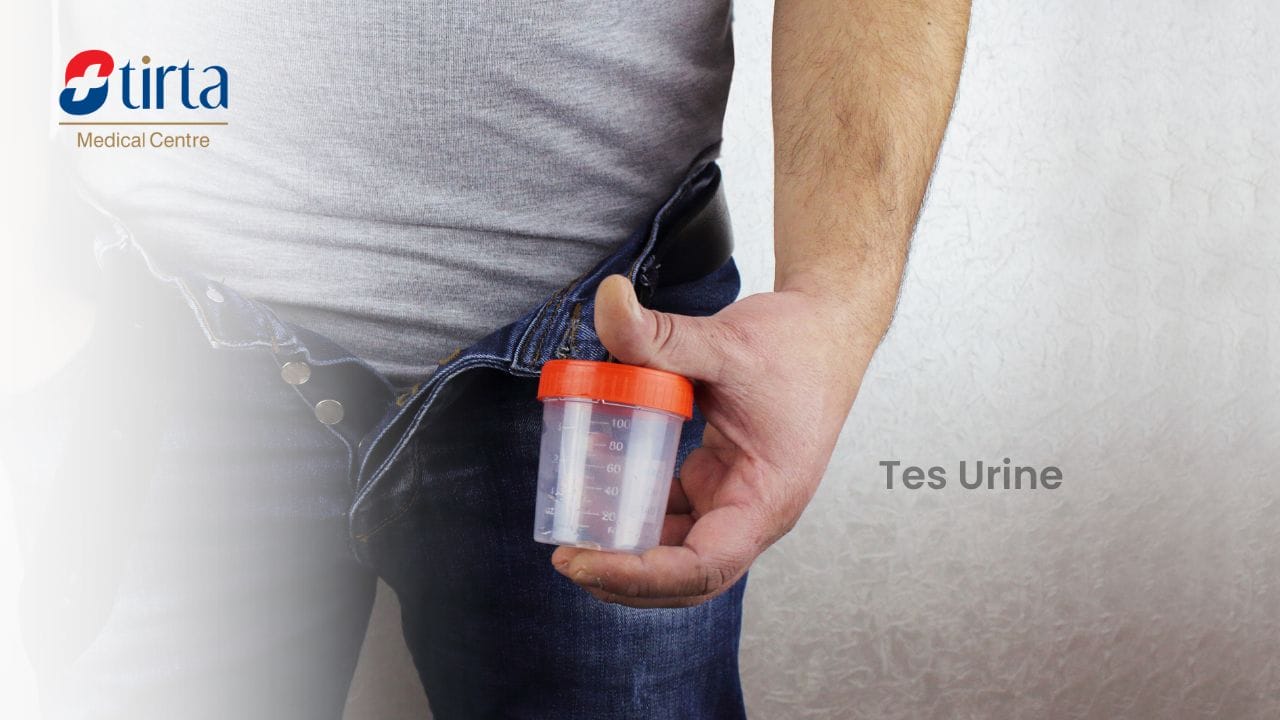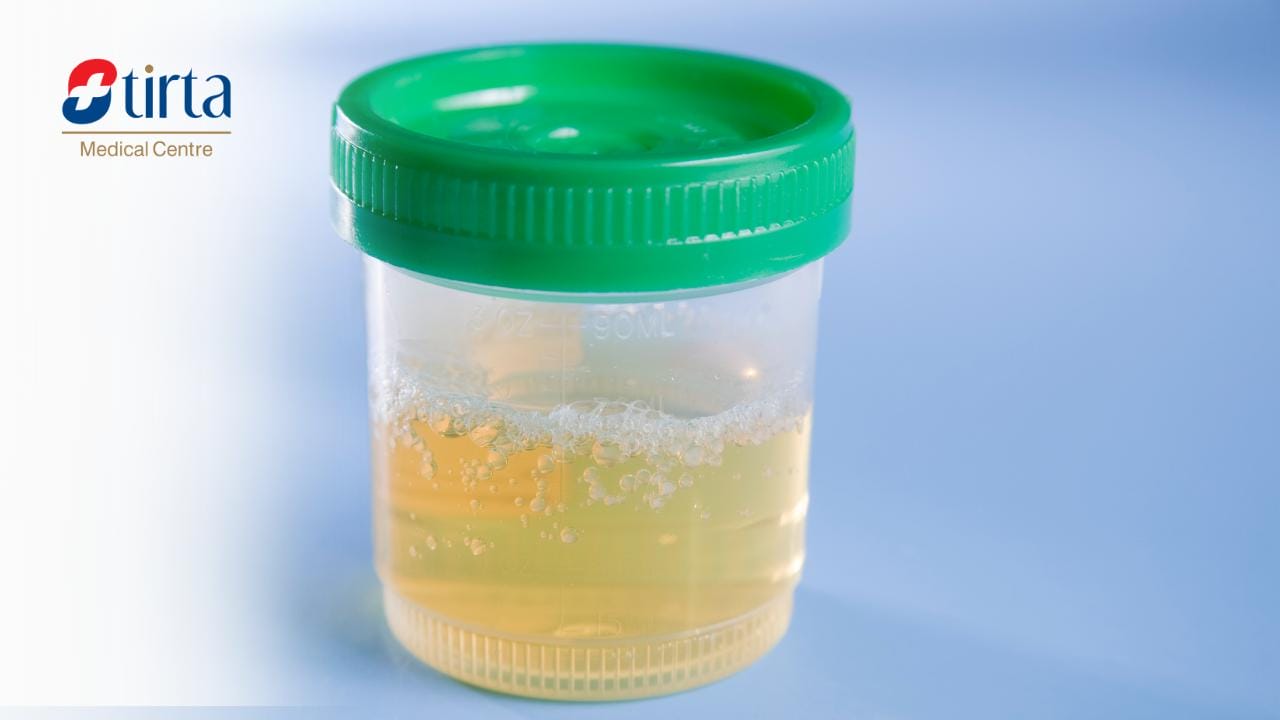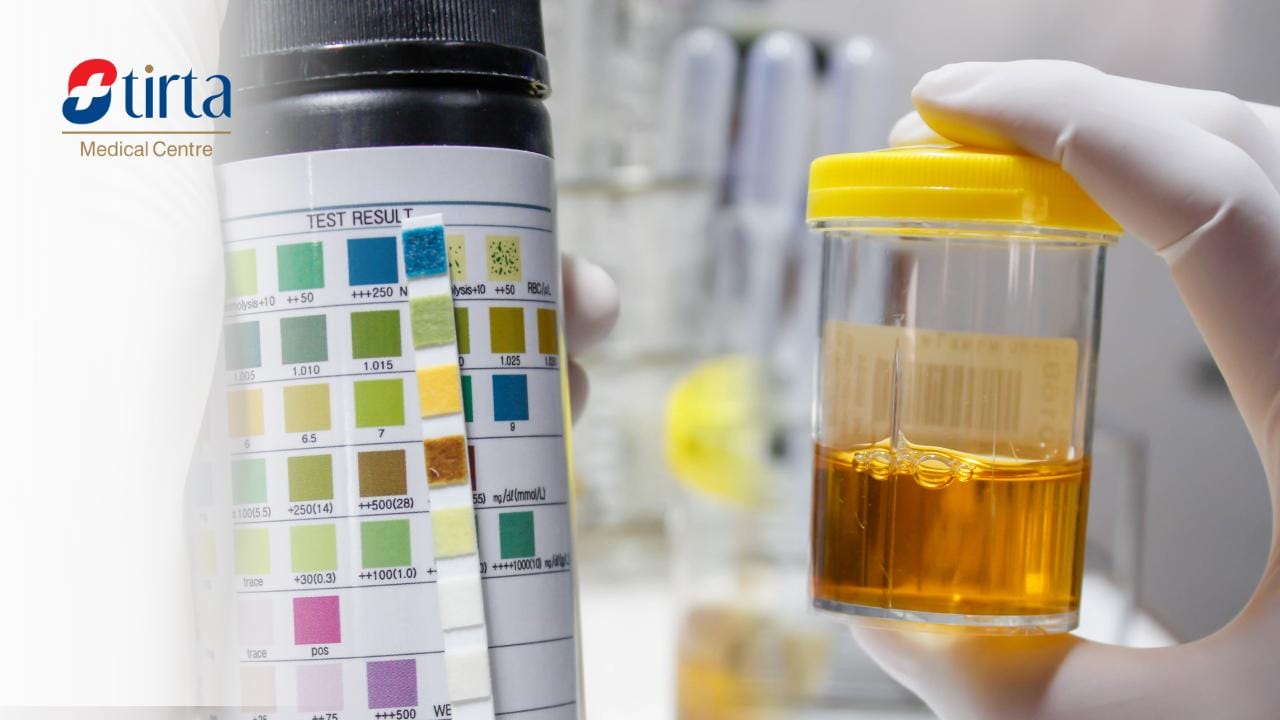Urine tests are laboratory examinations that use urine samples to detect various health conditions.
Tirta friends can find complete information related to urine tests, including the types of urine tests, their benefits, and recommendations for testing locations.
What is a Urine Test?
A urine test is a laboratory examination that analyzes a urine sample to detect and monitor various health conditions. A urine test, or urinalysis, examines the physical appearance, chemical makeup, and microscopic elements of urine.
This examination evaluates the urinary system and can indicate overall health issues since urine includes biomarkers that show the body’s metabolic function.
Types of Urine Tests
There are three main methods in urinalysis:
1. Physical Examination (Visual)
Evaluation of the physical characteristics of urine includes:
- Color and clarity
- Consistency
- Odor
- Volume
2. Chemical Examination (Dipstick)
Using special reagent strips to detect:
- Protein
- Glucose
- Ketones
- Bilirubin
- Urine pH
- Nitrite
- Leukocyte esterase
3. Microscopic Examination
Analysis using a microscope to identify:
- Red blood cells
- White blood cells
- Bacteria
- Crystals
- Casts
- Epithelial cells
Benefits of Urine Tests
Urine tests or urinalysis are laboratory examinations that have several important benefits in the medical field. Here are the main benefits of urine examination:
1. Evaluation of General Health
Urine tests can be included in regular health check-ups, such as yearly physicals, pre-surgery tests, or initial screenings for health issues.
This examination provides an overview of the body’s metabolic function and can identify health problems before significant symptoms appear.
2. Diagnosis of Medical Conditions
Urinalysis is important for identifying health issues, particularly if a patient shows signs like abdominal pain, back pain, trouble urinating, or blood in urine.
This test can identify conditions such as urinary tract infections, diabetes, or kidney disease.
3. Disease Monitoring
For patients with long-term health issues like diabetes, kidney disease, or lupus, routine urine tests help monitor disease progression and evaluate the effectiveness of treatment.
Changes in urine composition may indicate the need for therapy adjustments.
4. Pregnancy Detection
Urine tests are commonly used to detect pregnancy through the measurement of the HCG hormone levels. This method can be performed at home using a test kit or at a healthcare facility.
5. Evaluation of Metabolic Disorders
Urine tests can identify metabolic disorders such as ketonuria, which indicates that the body is burning fat as its primary energy source.
This condition is often found in patients with uncontrolled diabetes or individuals on a ketogenic diet.
6. Drug Screening
Urine tests are effective in detecting the presence of illicit substances or their metabolites in the body. This examination is often used in drug screening, alcohol use evaluation, or detection of toxic substances.
7. Kidney Stone Evaluation
Urinalysis can help identify the causes of kidney stone formation by analyzing calcium levels or urine acidity. This information is crucial for determining appropriate prevention and treatment strategies.
8. Cancer Detection
Urine tests can help find certain cancers, like bladder or kidney cancer, by spotting abnormal cells or markers.
When is a Urine Test Needed?
Urine tests are recommended in the following conditions:
– Routine Examinations
- Annual Medical Check-Up (MCU)
- Pre-surgery evaluation
- Pregnancy tests
- General health screening
– Specific Conditions
- Pain or discomfort during urination
- Changes in urination frequency
- Lower back pain
- Fever accompanied by urinary tract symptoms
- Blood in urine
– Disease Monitoring
- Diabetes mellitus
- Kidney disease
- Liver disorders
- Recurrent urinary tract infections
Preparation Before a Urine Test
There are several things you should do and avoid before undergoing a urine test, including:
– Things to Do
- Drink sufficient water 2-3 hours before the test so that you can easily urinate for the sample collection. However, sometimes you may be asked to fast before the test.
- Inform the doctor about any medications, supplements, or vitamins you are taking.
- Avoid heavy physical activity before the test.
– Things to Avoid
- Sexual intercourse 24 hours before the test.
- Sample collection during menstruation.
How to Collect a Urine Sample Correctly
The correct procedure for collecting a urine sample begins with the preparation and continues with the following procedures for men and women:
– Sample Collection Preparation
- Use a sterile container provided.
- Wash your hands with soap and running water.
- Clean the genital area with antiseptic wipes.
– Urine Test Procedure for Women
- Sit or squat with legs wide apart.
- Open the labia and clean with wipes provided by the medical team.
- Discard the first part of the urine stream into the toilet.
- Collect the midstream urine (30-60 ml) into the sterile container.
- Close the container tightly.
– Urine Test Procedure for Men
- Clean the tip of the penis with wipes provided by the medical team.
- If uncircumcised, pull back the foreskin.
- Discard the first part of the urine stream into the toilet.
- Collect the midstream urine (30-60 ml) into the sterile container.
- Close the container tightly.
Diseases That Can Be Detected Through Urinalysis
Urine tests can detect various health conditions such as metabolic disorders, urinary system disorders, and systemic disorders.
– Metabolic Disorders
- Diabetes mellitus
- Diabetic ketoacidosis
- Protein metabolism disorders
– Urinary System Disorders
- Urinary tract infections
- Kidney stones
- Acute and chronic kidney failure
- Glomerulonephritis
- Nephrotic syndrome
– Systemic Disorders
- Liver disease
- Hemolytic disorders
- Systemic lupus erythematosus
- Hypertension
Urine Test Results
Normal urine test results generally show clear yellow color with a pH between 4.5-8.0, no protein or glucose, and minimal red and white blood cells (0-3 red blood cells and 0-5 white blood cells per field of view under a microscope).
– Normal Parameters
- Color: Clear yellow
- pH: 4.5-8.0
- Protein: Negative
- Glucose: Negative
- Ketones: Negative
- Bilirubin: Negative
- Nitrite: Negative
- Leukocyte esterase: Negative
– Normal Microscopic Components
- Red blood cells: 0-3 per field of view
- White blood cells: 0-5 per field of view
- Crystals: Minimal or absent
- Bacteria: None
How to Handle Abnormal Urine Test Results?
If abnormal urine test results are found, the doctor will perform a series of follow-up evaluations, including a thorough physical examination, additional laboratory tests, and diagnostic imaging if necessary.
Additionally, the doctor will provide specific treatment based on the diagnosis found.
– Follow-up Evaluation
- Thorough physical examination
- Additional laboratory tests
- Diagnostic imaging if necessary
– Medical Follow-up
- Administration of antibiotics for infections
- Dietary adjustments for metabolic disorders
- Specific therapy according to the diagnosis
- Referral to a specialist if needed
– Regular Monitoring
- Evaluation of treatment response
- Repeat urine tests
- Therapy adjustments if necessary
Where to Perform a Urine Test
Tirta Medical Centre (TMC) is a leading healthcare facility offering comprehensive urine tests. With over 30 branches across Indonesia, TMC offers:
- More than 20 years of experience
- High-quality & reliable laboratories in Indonesia
- Experienced medical staff
- Accurate and fast results
- Professional service
Tirta friends can undergo urine tests at affordable prices. The complete urine test at TMC costs IDR 55,000.
Note: Prices are subject to change. You can contact us for updated pricing or book an appointment online here:
TMC branches are located in major cities such as Jakarta, Surabaya, Tangerang, and other cities, with flexible operating hours to make access easier for patients.
References:
- Academic Journal Publisher Poltekkes Kemenkes Kendari. Accessed in 2024. Comparison of Urinalysis Results Using Dipstick and Microscopic Methods at Bintang Timur Clinic, Sorong City: https://myjurnal.poltekkes-kdi.ac.id/index.php/hijp/article/view/563/1001
- Open Journal System of Sekawan Institute. Accessed in 2024. Complete Urine Examination Using the Dirui FUS-2000 Tool at the Pathology Laboratory of RSUD Abdoel Wahab Sjahranie Samarinda: https://journal.sekawan-org.id/index.php/jsn/article/download/383/233/
- Journal of Indonesia Laboratory Students (JILTS) Poltekkes Kemenkes Mataram. Accessed in 2024. Overview of Pathological Color Urine Examination Result by the Dip Cark Method: https://jilts.poltekkes-mataram.id/index.php/home/article/download/21/15
- Mayo Clinic. Accessed in 2024. Urinalysis: https://www.mayoclinic.org/tests-procedures/urinalysis/about/pac-20384907
- Healthline. Accessed in 2024. Urinalysis: Process, Results, and More: https://www.healthline.com/health/urinalysis
- WebMD. Accessed in 2024. Urinalysis Urine Test: Types, Results, Nitrites/Nitrates, pH, & More: https://www.webmd.com/a-to-z-guides/what-is-urinalysis
- MedlinePlus. Accessed in 2024. Urinalysis: https://medlineplus.gov/urinalysis.html
- Cleveland Clinic. Accessed in 2024. 24-Hour Urine Test: What It Is, Purpose, Procedure & Results: https://my.clevelandclinic.org/health/diagnostics/24-hour-urine-test








